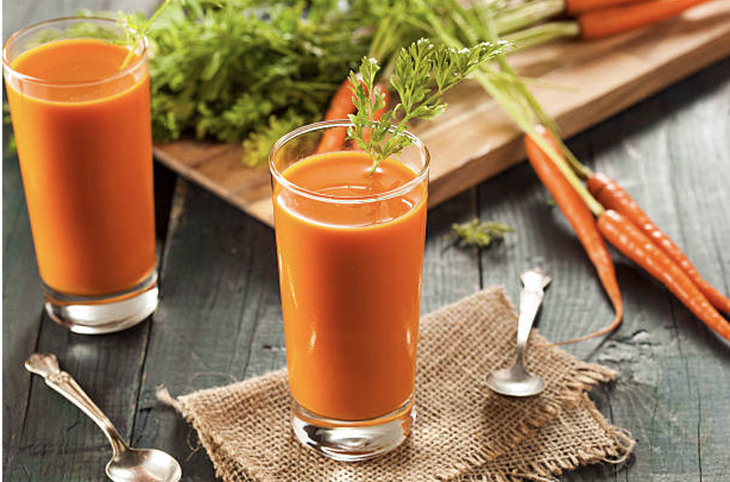Carrot juice - Illustration: IStock
How does carrot work?
According to doctors at Duc Giang General Hospital, 100g of carrots provide: 39Kcal, 7.8g glucid, 1.5g Protein, 0.2g Lipid and 1.2g fiber.
In addition, carrots also provide vitamin A: Beta-carotene in carrots is converted into vitamin A in the body, helping to maintain eye and skin health and strengthen the immune system.
Antioxidants: Carrots are rich in antioxidants such as beta-carotene and polyphenols that help protect the body against damage caused by free radicals and exposure to toxic substances.
Boost heart health: Carrots can help lower blood pressure, improve blood cholesterol levels and help prevent heart problems.
Support the digestive system: Fiber in carrots helps improve digestive function, reduce the risk of constipation and support nutrient absorption.
In addition, carrots contain a lot of pectin and lignin, two substances that have anti-toxic effects, precipitate and dissolve some typhoid and coli bacteria that cause diarrhea.
Vitamin A and antioxidants in carrots can help reduce skin damage caused by UV rays and external influences. Carrots can support the detoxification process and help improve liver health. Provides and supports the function of many essential enzymes in the body.
Harmful effects of eating too many carrots
Although carrots have many health benefits such as providing beta-carotene, vitamin A and fiber, consuming too many carrots can also cause some harm.
- Excess vitamin A : Consuming large amounts of beta-carotene from carrots can lead to excess vitamin A in the body, which can cause negative effects such as headaches, nausea, fatigue, liver damage and even harm cardiovascular health.
- Jaundice : Excessive consumption of carrots can also lead to carotenodermia, a phenomenon where the consumer's skin turns orange or yellow due to high levels of beta-carotene in the body.
- Methemoglobin condition: The nitrate and nitric content in carrots is very high (about 330mg KNO3/kg and 0.6mg NaNO2/kg). Consuming too many carrots can lead to the risk of poisoning, causing methemoglobin (abnormality in the blood).
Normally, methemoglobin accounts for 1-2%. When eating too many carrots, Nitrate (NO3-) in carrots will be converted into Nitric (NO2-) through the oxidation-reduction process, this process occurs both before and after eating. Nitric when entering the human body will convert hemoglobin (containing Fe2+) into methemoglobin (Fe3+), causing hypoxia.
Symptoms of poisoning from substances that cause this condition are often headache, fatigue, dizziness, nausea/vomiting, blue skin... Severe cases can also cause shortness of breath, convulsions, loss of bowel and bladder control, and death.
Therefore, although consuming carrots brings many health benefits, you need to maintain a balanced diet and not eat more than recommended to avoid potential harm to your health.
Experts recommend the frequency of carrot consumption for children: 2-3 carrot meals/week, no more than 150g/week (about 1-2 carrots/week)
Adults: 3 - 4 carrot meals/week, no more than 300g/week (about 3 carrots/week)
In treating diarrhea in children, children should only eat 30-50g of carrots per day, no more than 3 times per week to avoid excess vitamin A.
In addition, for root vegetables such as carrots, you should remove the core and peel them. Carrots can be boiled or stewed to reduce nitrate content.
Is drinking juice better than making it?
According to MSc. Ngo Thi Ha Phuong (Nutrition CommunicationEducation Center, National Institute of Nutrition), fruit is an indispensable food in daily meals.
Whole fruits contain sugars in the cell, which are not classified as free sugars; fruit juices (both fresh and industrially produced) contain sugars in the extracellular form (classified as free sugars).
Adding whole fruit to the diet may reduce markers of systemic inflammation, blood pressure, and body mass, and when substituted, may improve markers of glycemic control.
Therefore, from a cardiometabolic health perspective, whole fruit can consistently and reliably improve markers of cardiometabolic health and is the foundation of a healthy diet.
Fruit juice is not recommended as a substitute for whole fruit.
In addition, experts also recommend limiting fruit juice consumption to prevent excess calories and weight gain. Fruit should be consumed in whole segments and pieces and fruit juice consumption should be limited to no more than 150ml per day and industrial fruit juice with added sugar should be limited.
Back to topic
LINH HAN
Source: https://tuoitre.vn/uong-nhieu-nuoc-ep-ca-rot-coi-chung-vang-da-ngo-doc-20250707155341134.htm





























![[Photo] Signing of cooperation between ministries, branches and localities of Vietnam and Senegal](https://vphoto.vietnam.vn/thumb/1200x675/vietnam/resource/IMAGE/2025/7/24/6147c654b0ae4f2793188e982e272651)







































































Comment (0)